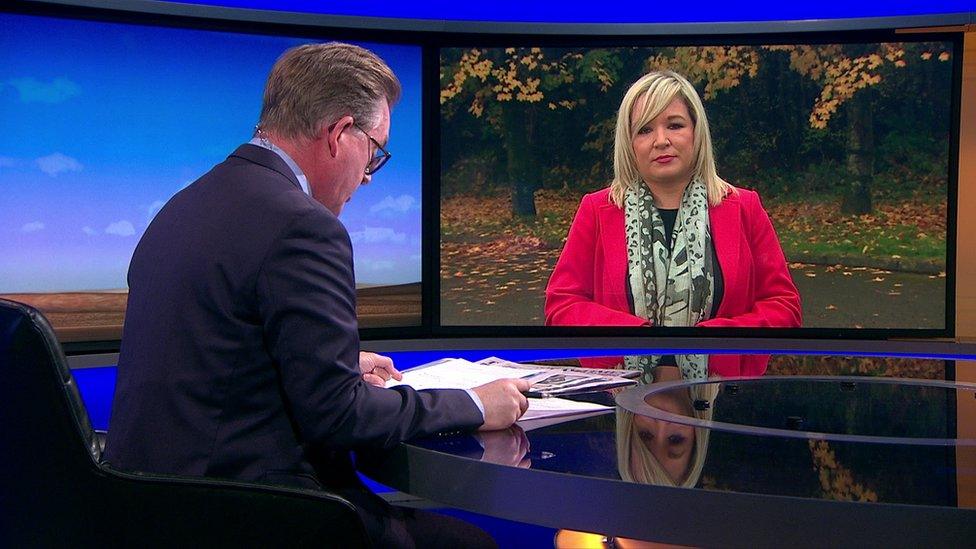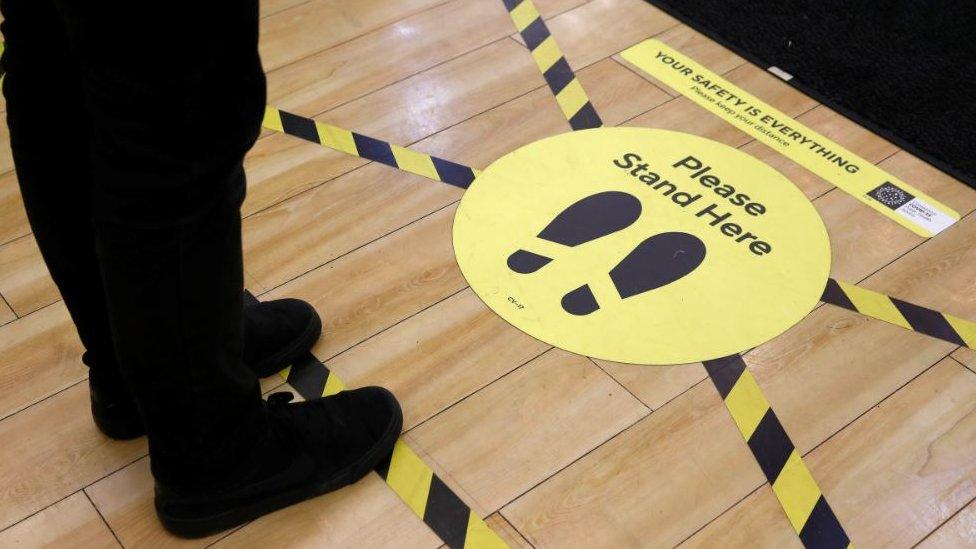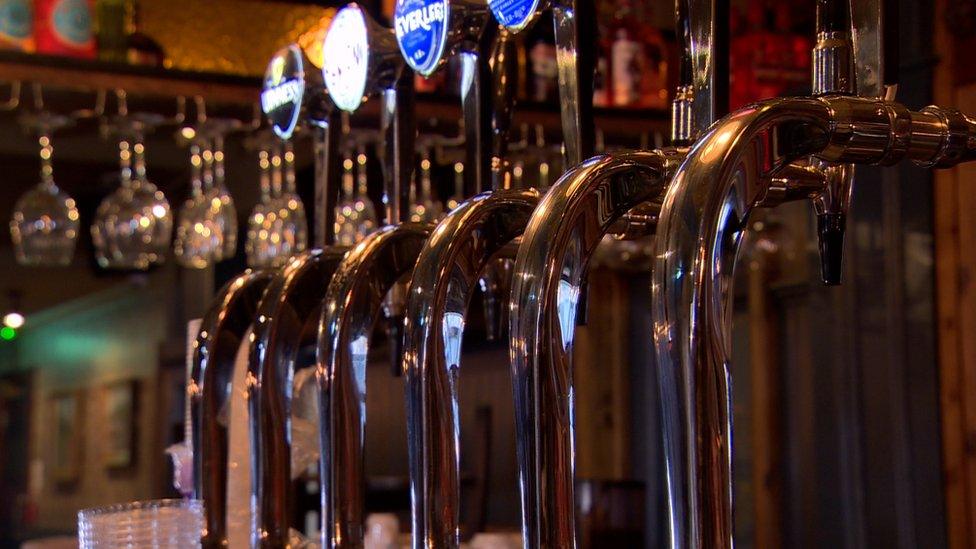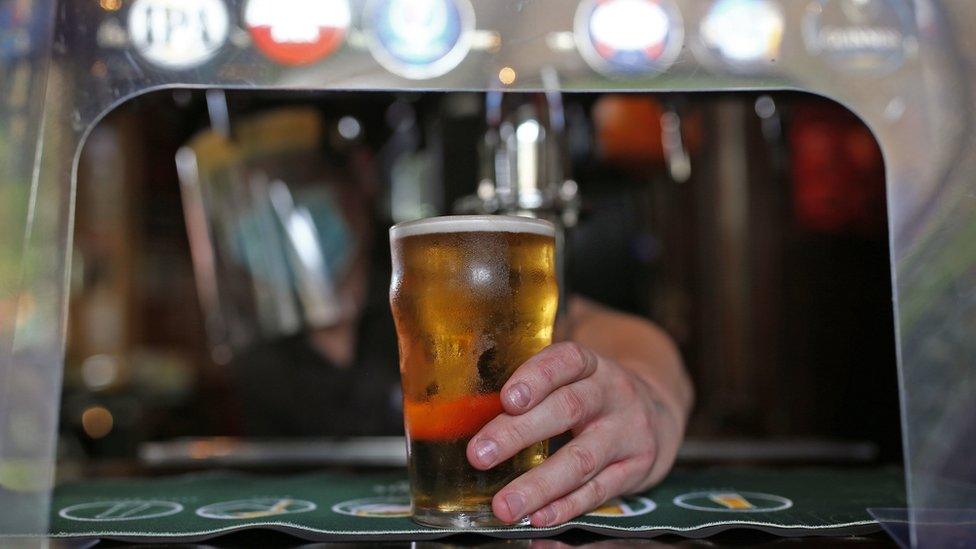Covid-19: Monday NI Executive meeting to look at current restrictions
- Published

Ms O'Neill said the executive was looking at reopening some areas of the hospitality industry
Cafes and restaurants could be allowed to reopen from Friday but not bars, the deputy first minister has suggested.
Michelle O'Neill said it was "something we are considering" ahead of the executive meeting to discuss easing some Covid-19 restrictions.
Current measures are due to end on Friday, and ministers have been advised pubs and restaurants should remain closed for another two weeks.
Ms O'Neill said there could be some "flexibility" for easing restrictions.
Speaking to the BBC's Sunday Politics, she said any decisions would be taken in a "graduated" manner.
Meanwhile, the Police Service of Northern Ireland (PSNI) has confirmed it has closed its training college at Garnerville in Belfast for two days for a deep clean.
Four student officers have tested positive for coronavirus and 15 more have been advised to self-isolate.
Ch Supt Emma Bond wished those affected a speedy recovery and said it was the first confirmed positive cases of Covid 19 concerning student officers since the beginning of the pandemic.
Speaking on Thursday, First Minister Arlene Foster said the restrictions imposed on 16 October had helped bring the R-rate - or reproduction number - down to 0.7.
However, Sinn Féin vice-president Ms O'Neill said that number did not take into account the reopening of schools last week, and the impact of that may not be known until next week.
'Coffee shop to nightclub'
On Sunday, there were seven further coronavirus-related deaths reported by the Department of Health in the previous 24-hour period.
It brings the total number of deaths reported by the department to 781.
There were also an additional 420 cases of coronavirus confirmed.
There are 55 people being treated in intensive care units and 41 of them are on ventilators.

Belfast Chamber chief executive Simon Hamilton said footfall across city businesses was down by 50%
In the Republic of Ireland, there have been two further coronavirus-related deaths and 542 new cases confirmed in the past 24 hours.
It brings the total confirmed cases to 65,394, while the death toll stands at 1,947. The number of people in ICU is 39, down one since Saturday.
'Very different scenarios'
Ms O'Neill said the executive would not keep any measure in place "longer than necessary" and they were looking at reopening some areas.
"For example, close- contact services, is there space for us to open those things up again from next Friday, in a very regulated way of course, on an appointment-by-appointment basis, a one-in one-out basis?" she said.
"The restrictions very much focus on the hospitality sector right now so we're looking at that wide family.
"Across hospitality, you've everything from a cafe or a coffee shop, right through to a nightclub and they're two very different scenarios.
"We're looking at whether there is any space or scope there to lift some of those things in a graduated way over the course of the next number of weeks."

The executive is looking at whether the hospitality industry can reopen but without alcohol
Hospitality business have called for clarity as soon as possible, but the deputy first minister said the sale of alcohol was a factor to consider in coming to a decision.
"We have to be very mindful of the fact that perhaps people's defences come down when there is alcohol taken.
"So what we're looking at is - are there ways that we can open things up perhaps without alcohol?
"If we can find a way to get ourselves into the new year with the restrictions that we bring in now, then that's the prize that we're going for here.
"We don't want to have to intervene again before Christmas, we want to be able to allow some flexibility to allow people to move around as much as possible, to allow as much of our economy to open up as possible."
'Fighting chance'
Belfast Chamber chief executive Simon Hamilton said footfall across businesses in the city was down by 50% and many firms were facing the "real prospect of closure and a serious number of job losses".
"If at least some life isn't breathed back into the city centre later this week, then I worry not only for those forced to remain closed but also those who can still trade but have decreasing numbers of people to trade to," he said.
"What I seriously see is a city centre that is on the edge with many businesses and their staff facing a dire future.
"What the executive decides this week will either kill off city and town centres or give them a fighting chance."
He has called on executive ministers to find a way to allow businesses to reopen for the traditionally busy Christmas period.
A Department of Health proposal, seen by BBC News NI, indicates that a two-week extension of the restrictions on hospitality until the end of November could mean the possibility of avoiding further interventions before Christmas.
The full interview with Michelle O'Neill was broadcast on Sunday Politics and is available on BBC iPlayer.
- Published5 November 2020

- Published3 November 2020
